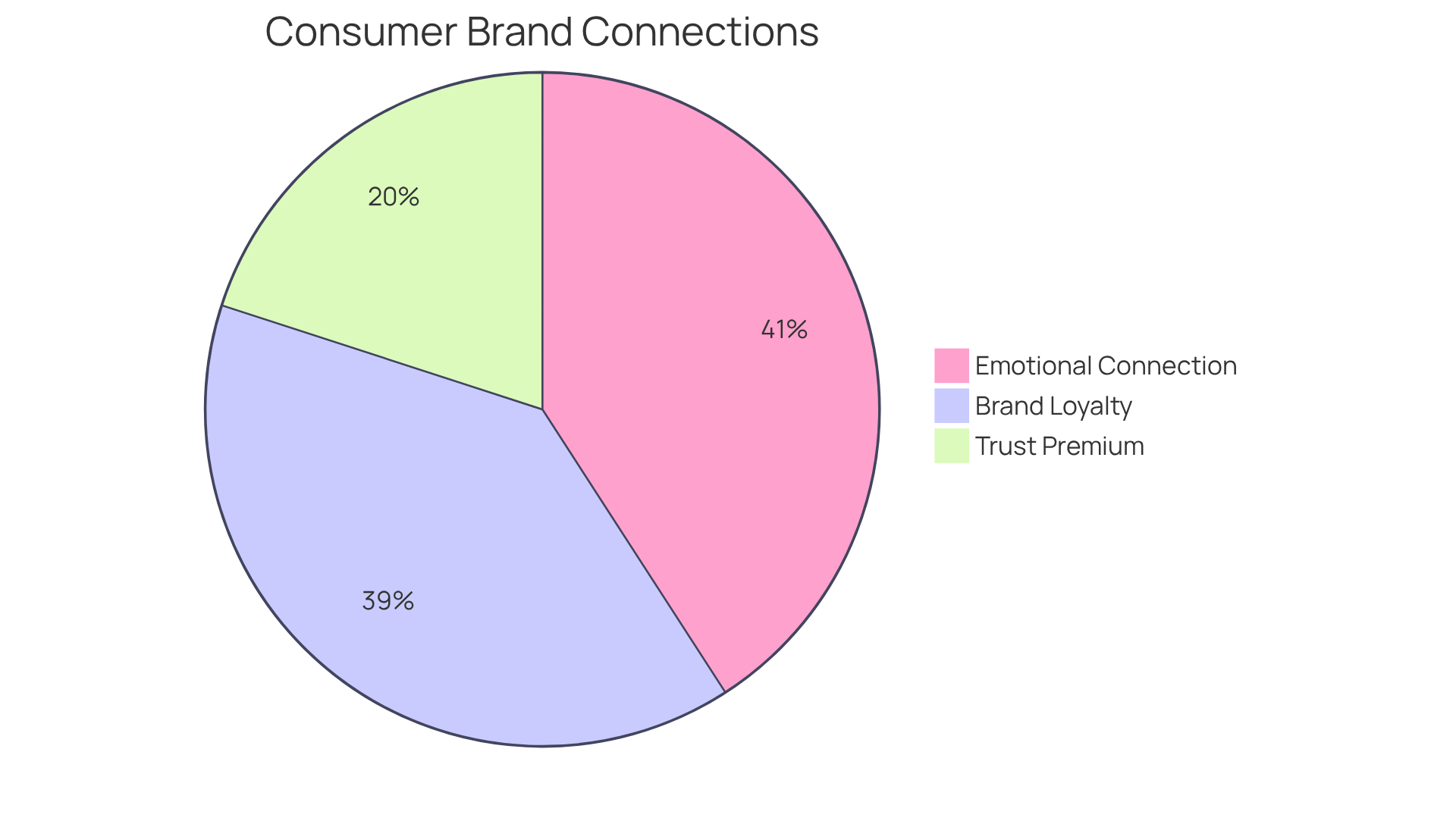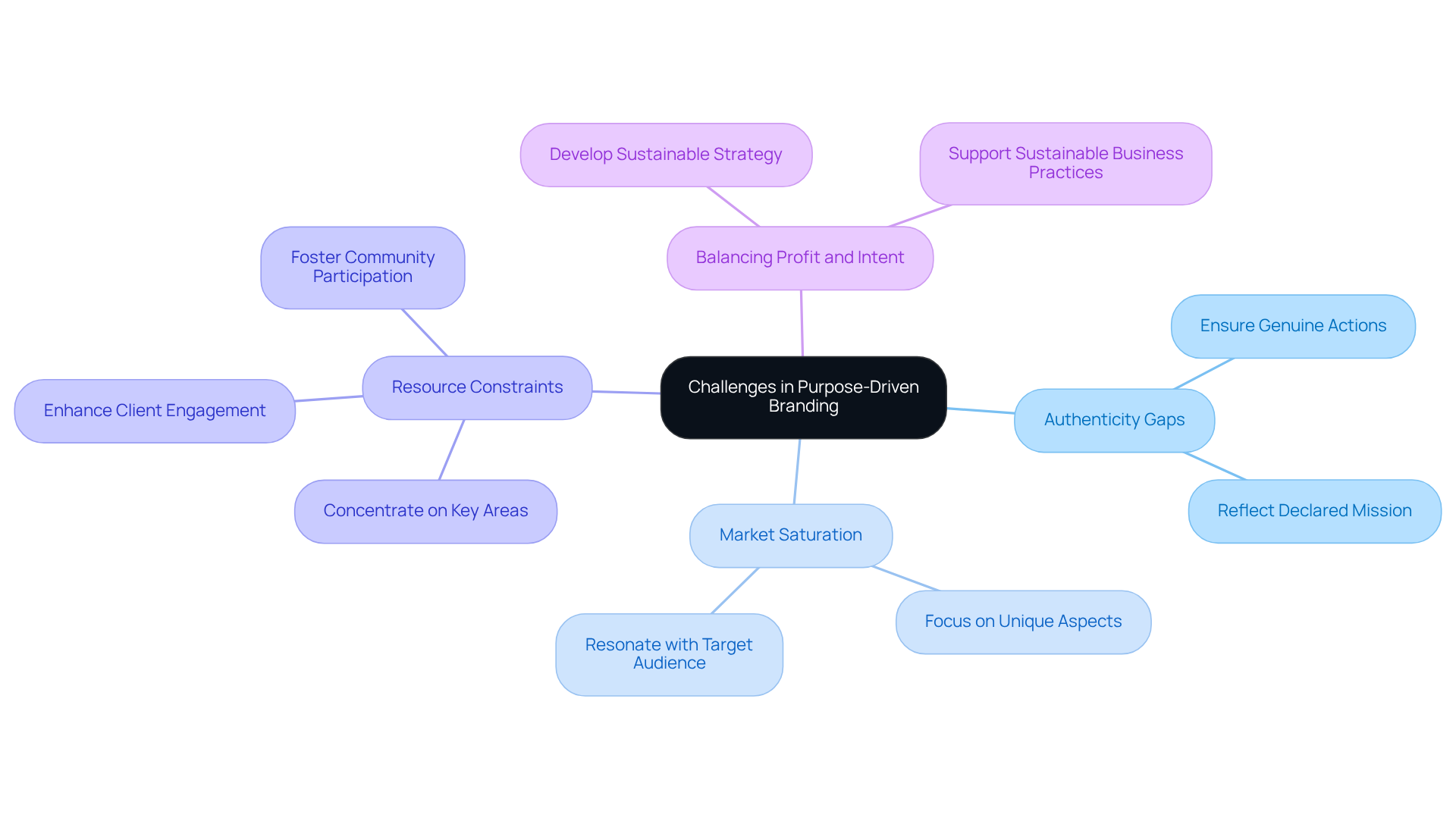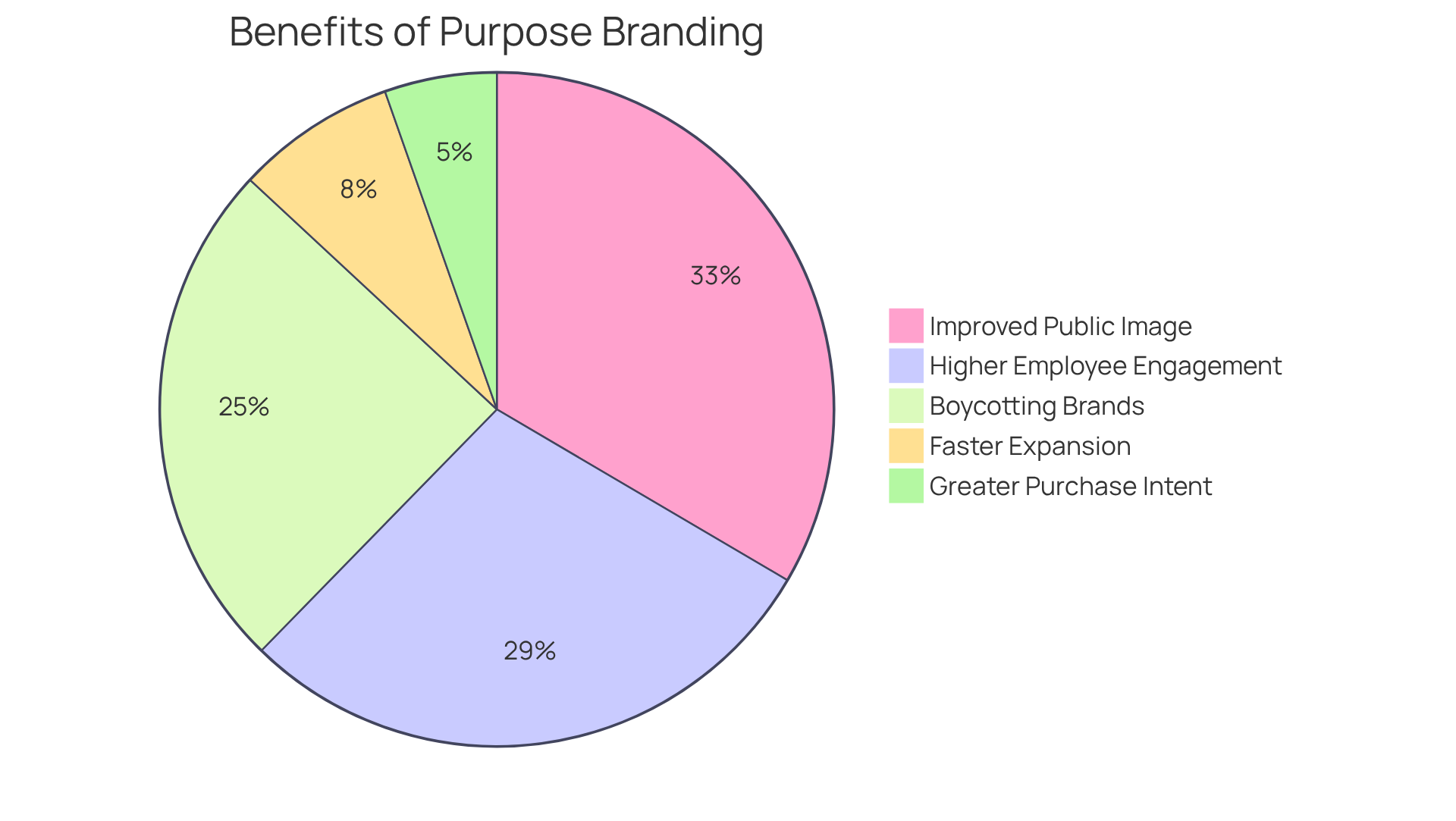Overview
In today's competitive landscape, tech startups often struggle to stand out and forge meaningful connections with their audiences. This challenge can feel overwhelming, as the pressure to differentiate themselves mounts.
However, effective branding with purpose can be a beacon of hope for these startups. By:
- Clearly articulating their mission
- Aligning their messaging
- Engaging their employees
- Measuring their impact
They can cultivate strong emotional ties with their customers. This approach not only enhances customer loyalty but also drives sustainable business growth. Remember, you are not alone in this journey; many founders face similar challenges, and together, we can navigate the path to success.
Introduction
In a marketplace overflowing with choices, tech startups often find themselves struggling to stand out among profit-driven competitors. This struggle can weigh heavily on founders, as the pressure to succeed intensifies. Yet, there is hope in embracing purpose-driven branding, a powerful approach that fosters deeper emotional connections with consumers and cultivates brand loyalty and trust.
How can startups weave their core mission into their branding strategy while avoiding common pitfalls? This article offers four essential steps to help tech startups harness the strength of purposeful branding, transforming challenges into opportunities for growth and community engagement.
Together, let’s explore this journey towards a more meaningful and impactful brand presence.
Define Purpose-Driven Branding
In today's competitive landscape, many tech startups face a pressing challenge: how to stand out in a market that often prioritizes profit over purpose. This profit-driven mindset can leave potential customers feeling disconnected and unvalued, which ultimately stifles loyalty and trust. The emotional bond between a brand and its audience is crucial, and when that bond is absent, it can lead to missed opportunities for meaningful connections.
However, there is a nurturing solution: branding with purpose. By focusing on a core mission and values that resonate with their audience, tech startups can forge a deeper emotional connection with customers. This approach not only addresses societal needs but also embodies branding with purpose by inviting authentic engagement with their target market. Companies like Apple and Tesla serve as shining examples of this strategy; their branding beautifully intertwines their missions—Apple’s dedication to innovation and user experience, and Tesla’s commitment to accelerating the transition to sustainable energy. Such alignment not only sets them apart but also cultivates a devoted customer base.
Consider this:
- 94% of clients endorse companies they feel a connection with emotionally.
- 90% of shoppers believe loyalty is essential in their purchasing decisions.
- 46% of shoppers are willing to pay more for products from a trustworthy company, underscoring the economic benefits of embracing a purpose-driven approach.
By embodying a mission that reflects consumer values, tech startups can significantly enhance their market presence through branding with purpose and pave the way for long-term success.
As Suzanne Shelton, CEO of Shelton Group, insightfully notes, "Consumers just want to buy from good companies — companies that are doing right by people and the planet." This sentiment encapsulates the essence of branding with purpose, encouraging tech startup founders to embrace their unique missions and .

Integrate Purpose into Your Brand Strategy
To effectively integrate purpose into your brand strategy, consider these supportive steps:
- Articulate Your Purpose: Start by clearly defining your brand's mission and values. Reflect on what your startup stands for and how it aims to make a positive difference in the world by embracing branding with purpose. It’s important to recognize that brands with a clearly defined mission tend to expand twice as rapidly as those that lack one. Moreover, 80% of consumers express that when they purchase from a company that practices branding with purpose, they feel they are contributing to a positive effect. This clarity is not just a formality; it’s vital for your growth and aligns with branding with purpose.
- Align Messaging: Ensure that all your marketing materials, from your website to social media posts, consistently communicate your purpose. Embrace storytelling as a form of branding with purpose to illustrate how your company's mission positively impacts both customers and the community. Remember, effective storytelling can enhance a company's value by up to 20%. Organizations that share their narrative consistently often see a 20% rise in value, making this a powerful tool in your marketing arsenal.
- Engage Employees: Foster a culture where your employees understand and embody the organization's purpose. This can be achieved through training sessions and internal communications that emphasize the significance of your mission. When your staff resonates with your values, they become genuine representatives of your brand, which ultimately strengthens through branding with purpose.
- Measure Impact: Regularly assess how well your brand is living up to its purpose. Collect feedback from clients and employees to identify areas for improvement and ensure alignment with your mission. Brands that consistently share their story and measure their impact often achieve branding with purpose, resulting in a significant increase in customer engagement and loyalty. In fact, 77% of consumers form stronger emotional bonds with purpose-driven companies. As Jeff Bezos wisely states, 'A label is like a reputation.' It is earned through consistently excelling in challenging endeavors.

Overcome Challenges in Purpose-Driven Branding
Tech startups often encounter significant hurdles when adopting a branding with purpose approach.
- Authenticity Gaps can create a sense of disconnect. It’s vital to ensure that your brand’s actions genuinely reflect its declared mission. Consumers are quick to spot insincerity, which can erode trust and connection.
- Market Saturation poses another challenge. In a crowded landscape, it can feel overwhelming to stand out. Focus on the unique aspects of your mission that resonate with your target audience; these distinctive elements can foster deeper connections.
- Resource Constraints are a reality for many startups. Limited resources may hinder the full implementation of purpose-driven initiatives. Concentrate on key areas where your mission can make the most significant impact, such as enhancing client engagement or fostering community participation.
- Lastly, Balancing Profit and Intent is crucial. While your mission is essential, . Develop a strategy that harmonizes both, ensuring that your purpose supports sustainable business practices.
By addressing these challenges with compassion and strategic focus, tech startups can navigate their journey toward branding with purpose with confidence and clarity.

Leverage Benefits of Purpose-Driven Branding
Embracing branding with purpose can truly transform tech startups by addressing a common challenge many founders face: standing out in a crowded market. The emotional toll of competing for attention can be overwhelming, yet there’s hope. By engaging in branding with purpose that resonates with a clear mission, startups can foster deeper emotional connections with their customers, leading to enhanced loyalty. Research shows that mission-driven companies not only report 1.4 times greater purchase intent but also expand at double the speed of others, illustrating a profound relationship between a company's mission and consumer behavior.
In such a competitive landscape, having a strong mission is essential. It not only distinguishes your identity but also makes it more memorable and appealing. Brands that focus on branding with purpose have been shown to outperform the stock market by an impressive 134%, highlighting the financial advantages that come with a well-defined mission.
Moreover, purpose-driven companies attract employees who are genuinely passionate about their mission. This passion translates into higher engagement and retention rates, fostering a vibrant workplace culture. When employees feel , it enhances customer service and brand advocacy. In fact, 75% of employees expect their employers to take a stand on social issues, emphasizing the importance of mission in attracting and retaining top talent.
Finally, companies that emphasize their mission enjoy a significantly better public image, which builds trust and credibility. Consumers are 87% more inclined to purchase from businesses that demonstrate social responsibility, leading to increased sales and consumer advocacy. Furthermore, 81% of shoppers want clarity regarding a company's purpose initiatives, underscoring the need for accountability in building trust. It’s also noteworthy that 64% of global consumers actively boycott brands that don’t align with their beliefs, reinforcing the necessity of branding with purpose to nurture customer loyalty. By embracing a mission, tech startups can not only thrive but also create a positive impact in their communities.

Conclusion
Embracing purpose-driven branding is not just a strategy; it’s a heartfelt necessity for tech startups striving to stand out in a bustling marketplace. The challenge lies in prioritizing a clear mission and values that truly resonate with your audience. By doing so, you can cultivate genuine emotional connections with your customers. This nurturing approach not only deepens brand loyalty but also paves the way for sustainable growth and success, as evidenced by industry leaders who have seamlessly woven purpose into their branding strategies.
Throughout this article, we’ve explored the vital importance of articulating a defined purpose, aligning your messaging, engaging your employees, and measuring your impact. Each of these steps is crucial in ensuring that your brand’s actions genuinely reflect its mission. This alignment helps overcome challenges such as authenticity gaps, market saturation, and resource constraints. The rewards of adopting a purpose-driven approach are profound:
- Increased customer loyalty
- Enhanced employee engagement
- Stronger public perception
Ultimately, we encourage you, as tech startups, to embrace the transformative power of purpose-driven branding. By committing to a mission that aligns with consumer values, you can not only thrive in your industries but also make a positive contribution to society. The call to action is clear: let’s embrace a purpose that resonates, engage authentically with your stakeholders, and measure the impact together to build a brand that stands the test of time.
Frequently Asked Questions
What is purpose-driven branding?
Purpose-driven branding focuses on establishing a core mission and values that resonate with an audience, creating a deeper emotional connection between a brand and its customers. This approach addresses societal needs and fosters authentic engagement.
Why is emotional connection important in branding?
An emotional bond between a brand and its audience is crucial for building loyalty and trust. When this bond is absent, brands risk missing out on meaningful connections and opportunities for customer engagement.
How can tech startups benefit from purpose-driven branding?
By embodying a mission that reflects consumer values, tech startups can enhance their market presence, foster customer loyalty, and pave the way for long-term success.
What are some statistics that support the importance of emotional connections in branding?
94% of clients endorse companies they feel a connection with emotionally, 90% of shoppers consider loyalty essential in their purchasing decisions, and 46% are willing to pay more for products from trustworthy companies.
Can you provide examples of companies that practice purpose-driven branding?
Apple and Tesla are notable examples, with Apple focusing on innovation and user experience, and Tesla committed to accelerating the transition to sustainable energy. Their branding aligns with their missions, helping cultivate a loyal customer base.
What does Suzanne Shelton, CEO of Shelton Group, say about consumer preferences?
Suzanne Shelton notes that 'Consumers just want to buy from good companies — companies that are doing right by people and the planet,' highlighting the importance of purpose-driven branding in attracting customers.




